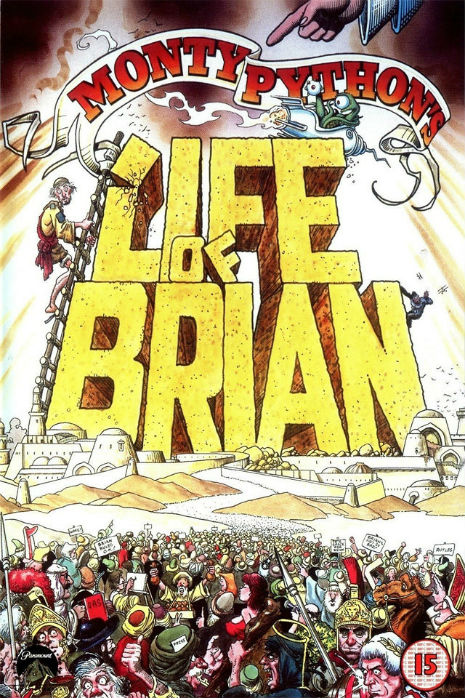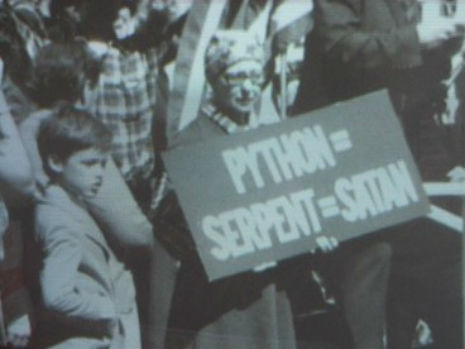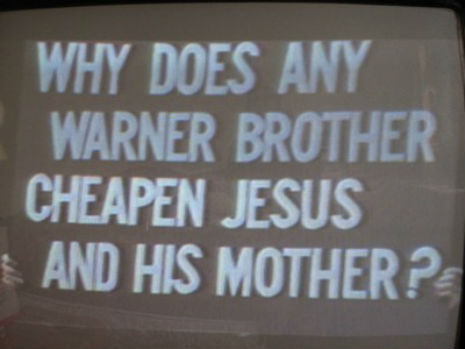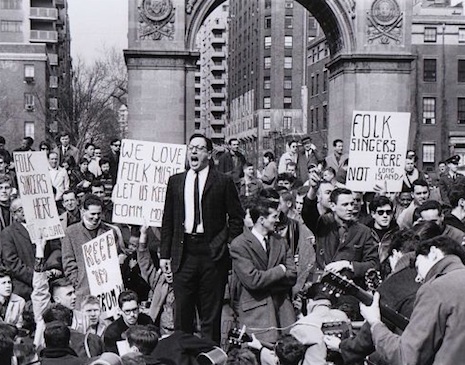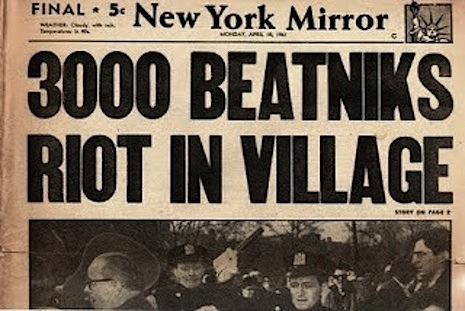Thursday, March 31, 2016
Wednesday, March 30, 2016
Atheist Group Suing To Get
‘In God We Trust’ Off US Currency
A group of Atheists in Ohio has filed a federal suit to get the slogan “In God We Trust” off of the money. The attorney leading the group of 41 atheists, Michael Newdow, also sued to get “under God” out of the Pledge of Allegiance, although that campaign ended unsuccessfully. The plaintiffs are people that handle money everyday. Newdow is arguing that handling the money that has “In God We Trust” on it imposes on them every time they do so.
He argues that the plaintiff is having to spread a message she doesn’t believe in everytime she handles U.S. currency:
“Rather, her beliefs require that she trust in her own abilities and a general responsibility to lead an ethical life. In handling the money, therefore, she is repeatedly unwillingly confronted with the words ‘In G-d We Trust.’ Thus, she is forced against her will to accept and re-distribute to others a message that goes wholly against her beliefs. Yet it is neither realistic nor reasonable for her to abandon the nation’s currency and use other forms of payment for all of her transactions.”Naturally, he has rustled a few feathers among Christian groups. We have a constitutional guarantee to the separation of church and state despite what the fundies try to say. This time, the Christians are saying he is trying to tear down our nation’s motto. No matter how many times conservative groups say it, we are NOT a Christian nation.
But, is it really our motto? It has not always been on the money. It was first put on coins in 1864 during the Civil War. It did not make it to the paper money until the 1950s.
There is a deeply ingrained distrust of Atheists in our culture. Research at Nottingham Trent University has concluded:
“Anti-atheist prejudice is not confined either to dominantly religious countries or to religious individuals but rather appears to be a robust judgment about atheists.”They told a hypothetical story of a man finding a wallet on the ground and taking the money. The participants were told to guess what religion the man is. Most thought that the man was an atheist. We need to get the word out that not all atheists are bad. Taking God out of our money is a great start to a more inclusive society.
I think it's unfair, and disgusting to have government offices and government papers to be adorned with faith based language.
-GEF
Tuesday, March 29, 2016
NYC’s New Generation of Militant Activists —
And The Media Blackout That Has Followed

Over the past year and a half, New York City has seen the growth of an organized, militant grassroots movement, lead by young activists of color and completely ignored by the mainstream media. Gaining steam a few months after the Ferguson Uprising in 2014, tens of thousands of New Yorkers began taking to the streets to demand justice for Mike Brown and Eric Garner. Now, seventeen months later, a coordinated network has formed, shutting down the streets on a weekly basis in every single borough. If one only listens to the reporting by mainstream media, it would paint a naive, racist depiction of a movement that has seemingly “died down.” However, the reactionary behavior of the establishment and the NYPD, one of the largest police forces in the amerikkkan empire, reveals an entirely different narrative.
Activists on the ground in NYC are facing heavy state repression, including the targeting of organizers’ cell phones during protests, phone surveillance, false arrests, and political trials dragging on for months in the New York City court system. If this movement wasn’t a threat, if our organizing didn’t have a chance at the people’s collective liberation — then why are we flanked every single week by one of the nation’s largest counter-terrorist police units? Why are our communications being monitored and controlled by military grade surveillance technology? Why is the NYPD legal unit prosecuting violation charges, using resources to take summons tickets to lengthy political trials? When put into this context, the state and the establishment admit to a very different fight than they are letting on to the general public.
Groups such as Millions March NYC, Grand Central Crew: NYC Shut It Down, Cop Watch Patrol Unit, Peoples Power Assemblies, ICEFREENYC, Why Accountability, NYers Against Bratton, Justice for Akai Gurley, Afrikans Helping Afrikans, Black Lives Matter NYC, and the Campaign to Shut Down Rikers have organized major mobilizations and direct actions for a year and a half, bringing thousands of protesters to the streets on a consistent basis. These activists are young, radical and militant, with many of the aforementioned groups connected in large and expanding coalitions. Circumventing traditional respectability politics, themes of Fuck the Police are embraced, with organizing taking place on encrypted phone threads, allowing for quick and coordinated responses to push our revolutionary agenda against the racist, capitalist state intent on silencing us. We are young, we are revolutionary, we are absolutely not afraid — and the state wants more than anything to silence our momentum and kill this movement.
Major solidarity marches with Baltimore, Cleveland, Charleston, Ferguson, Minneapolis, Texas and San Francisco have shut down the streets with thousands of people, often organized in less than 36 hours. #PeoplesMonday has shut down the streets across all 5 boroughs every single Monday for over a year. Solidarity ties have strengthened between Black liberation and Palestinian liberation groups, building the groundwork for what could grow into an international proletarian struggle. Direct actions have targeted and disrupted Mayor de Blasio, Bronx DA Robert Johnson, DOC Commissioner Ponte, Donald Trump, and numerous local city government and jail officials. A newly formed grassroots coalition, The Campaign to Shut Down Rikers, has built momentum to shutter NYC’s most notorious jail complex, with coffins delivered to Mayor de Blasio at City Hall and to the home of Bronx DA Robert Johnson for Kalief Browder. Just this past November, DOC Commissioner Ponte was disrupted at a Board of Corrections Hearing, and the proposed harmful reforms were revoked shortly after. Justice for Akai Gurley and family organizing has led to the first conviction of an NYPD officer in 10 years. Typically there are multiple arrests every single week of lead organizers fighting back in the streets, and numerous trial dates and civil litigations are currently taking place.
The mainstream media has ignored all of the above for almost a year and a half. This is certainly not an accident — rather it is a strong indication to the extent of the fear on the side of the establishment. All we have as activists to fight back are our voices and our bodies. When we are then subsequently being silenced in the media and locked up by the counter-terrorist NYPD police unit — evidently, both our voices and our bodies are considered a high threat by those maintaining the status quo. To put it simply, clearly we are a threat of becoming free.
As state repression and racial tensions continue escalating locally and nationally, the stakes are too high for the media to exist as a deceptive “neutral” apparatus. Protesters today are being arrested for “walking on the sidewalk”, while demanding justice for a black man who was killed standing on the sidewalk. This is the amerikkka we are in today, and this was the amerikkka we were in 400 years ago when our country was built on the genocide of Indigenous people and enslavement of Black people. It is time to make the tough decisions, publish the uncomfortable truths, and make the radical choice of oppression or liberation. There is an active genocide happening in our backyard and all over the world of people of color and poor people. The united states of amerikkka has become one of the largest open air slave camps in the history of mankind, with over 2 million people in cages and 7 million under correctional control, backed by its imperialist allies waging exploitive wars and massacres abroad. The only ecological system that sustains us with life, the Earth itself, is imminently collapsing under the white supremacist, capitalist, hetero-patriarchy. The civilization built by the west, built by the white man — is now threatening the very survival of humanity, and with it, all forms of life on the planet. It is long past the time to face the truth. If we are to survive, the distinctions have to be made, the sides have to be chosen, and the fight has to be picked up immediately. Otherwise, only history will live to tell the truth, and the blood will be on your hands.
Which narrative will our civilization survive to tell?
Monday, March 28, 2016
School of Life Mondays:
How to become a better person
from The School of Life:
It sounds normal to say one's out to become a fitter person; but it sounds weird to say one would like to be a nicer or better person. It shouldn't - so here is a guide to 10 virtues of a nice person.
Sunday, March 27, 2016
Review: 'Pee-wee's Big Holiday' (loved it)
Last night my eight-year-old daughter and I enjoyed Pee-wee's Big Holiday. This is a fantastic return for Pee-wee Herman, and Paul Reubens has done a masterful job. Pee-wee's charm, innocence, and awesome moral compass are still keeping him out of trouble, despite a cast of delightfully troublesome characters that pop up along the way.
This is another Pee-wee Herman road movie. Pee-wee is loving his life in Fairville, and hasn't left since the events of his last feature film. When phenomenally cool stranger and well-known actor Joe Manganiello (portrayed by himself) comes to town, the two become instant friends. Manganiello invites everyone's favorite adorable man-child to his birthday party, which happens to be in just five days and in glamorous New York City. The invitation rekindles Pee-wee's sense of adventure, and he takes to the open road. Raucous hilarity ensues.
My daughter told me she really likes Pee-wee. He is cute, very nice, and oh so funny. I have to agree. This film is was great fun for us both! Pee-wee's playful innocence and charming smirk are in perfect tune. Interesting and sometimes slightly creepy characters appear with every scene change. Rube Goldberg machines, silly disguises, crazy locations, and improbable events abound.
Big Holiday is a reprise of Pee-wee's Big Adventure, one of the most hilarious films of all time. The new Netflix feature is not the same adventure you remember from the 1985 cult classic, but close enough to press all your happy nostalgia buttons. Paul Reubens exudes 100% of the boyish charm and delight we expect in Pee-wee. His high-pitched scream still pierces even after 30 years. His smile and giggle are still infectious. Director John Lee manages to get the rest of the cast to play along with Reubens perfectly, while dropping easter egg after easter egg for longtime fans. Mark Mothersbaugh did an amazing job with the soundtrack--absolutely reminiscent of Danny Elfman's work for Big Adventure, but stand-alone wonderful.
Pee-wee's Big Holiday, via Netflix
I also have an eight year old, he and I enjoyed it as well!
Saturday, March 26, 2016
Abandoned hotels in the Egyptian desert may as well be on another planet [or a James Bond movie set!]
The word ruins ordinarily conveys a connotation of scarcely delineated brick walls and rubble dating back hundreds if not thousands of years, but the work of German artists Sabine Haubitz and Stefanie Zoche serves as a powerful reminder that unfortunate events, especially economic ones, can easily create ruins of much more recent vintage almost anywhere.Haubitz and Zoche’s 2006 book Sinai Hotels vividly documents hotel projects in the Egyptian desert that were commenced in good faith but then, for reasons unknown, were abandoned. In virtually every case, the failed investment projects resulted in concrete foundations but remarkably little else, stranded in an otherwise vacant landscape of sand.
Caitlin Peterson has written that the buildings in the series
have proven to be the ruins left by misinvestment in state-funded tourism projects. The sculptural shells point to one of the consequences of a tourist industry that encourages uncontrolled urban development of whole landscapes and, against the backdrop of current political developments, amounts to a socio-political fuse. In their promise of holiday idylls, the names of hotel chains, which the artists have adopted for their titles, jar with discrepancy against the abandoned concrete skeletons in the pictures.
As John Coulthart astutely observed, the images have a distinctively Ballardian quality, suggesting a peculiarly modern form of decay.Quite right—the pictures evoke any number of notable Ballard volumes—Concrete Island, Vermilion Sands, High-Rise......
Friday, March 25, 2016
Keep your scythe, the real green future is high-tech, democratic, and radical

from BoingBoing:
"Radical ecology" has come to mean a kind of left-wing back-to-the-landism that throws off consumer culture and mass production for a pastoral low-tech lifestyle. But as the brilliant science journalist and Marxist Leigh Phillips writes in Austerity Ecology & the Collapse-Porn Addicts: A Defence Of Growth, Progress, Industry And Stuff, if the left has a future, it has to reclaim its Promethean commitment to elevating every human being to a condition of luxurious, material abundance and leisure through technological progress.
Phillips is a brilliant writer and an incisive scientific thinker with impeccable credentials in the science press. He's also an unapologetic Marxist. In this book -- which is one of the most entertaining and furious reads about politics and climate you're likely to read -- he rails against the "austerity ecology" movement that calls for more labor-intensive processes, an end to the drive to increase material production, and a "simpler" life that often contains demands for authoritarian, technocratic rule, massive depopulation, and a return to medieval drudgery.
It wasn't always thus. The left -- especially Marxist left -- has a long history of glorifying technological progress and proposing it as the solution to humanity's woes. Rather than blaming the machine for pollution, Marxists blame capitalism for being a system that demands that firms pollute to whatever extent they can, right up the point where the fines outweigh the savings.
As far back as Engels, Marxists refused to countenance the idea of limits to human growth. While Malthus was (incorrectly) predicting that humanity would exhaust its food stores any day now and plunge into barbarism, Engels wrote, in Outlines of a Critique of Political Economy:Even if we assume that the increase in yield due to increase in labour does not always rise in proportion to the labour, there still remains a third element which, admittedly, never means anything to the economist – science – whose progress is as unlimited and at least as rapid as that of population.But how can a finite planet sustain infinite growth? Through improvements in material processes. We use a lot less to make things today than we ever have, thanks to science -- and capitalism. The less labor and material used in a process, the less it costs to make and the more profit there is. But growth under market conditions also requires pollution/extraction/waste/overproduction:The firm not be able to pay for new materials or labour or the upkeep of its machines and will go out of business. This is why capitalists, left to their own devices, have no choice but to pollute or extract or pump out CO2 or catch fish at a rate that is heedless of what remains of our store of resources. It is not that they are evil or greedy. If one capitalist says to herself “To hell with the profits! The planet is more important!” then she will quickly be beaten by a rival who is not so scrupulous. To keep going, they will have to give up on such high-minded thoughts. And this is true regardless of size, whether a globe-rogering, $11-bajillion-market-cap, Taibbian vampire-squid investment bank or a mom-and-pop corner shop that sells nothing but thimbles of rosewater-scented whimsy and hand-sewn felt puppets of characters from Wes Anderson films. If right next door, a big-box chain-store Whimsy-Mart opens up with vats of all-you-can-eat cut-price Owen Wilson dolls and that small business doesn’t toughen up, then they’re fucked.Companies can only abstain from harmful conduct when the market is regulated -- no longer "free" -- and they are required to do or not do certain things that the state has banned. If all companies are required to follow the rules, then following them won't mean being undercut by a competitor. But regulation can't solve the problem, because it's always fighting a rear-guard action:...[H]owever much we want to regulate capitalism, there will always be some new commodity or market inadvertently ‘polluting’ that has yet to be regulated. So the regulator is always playing catch-up. Further, capital’s need for self-valorisation tends to strain at the leash of regulatory restraint, as there is always some jurisdiction where this regulation does not exist. Which means that there is a force in the economy constantly pushing toward pollution that we are forever trying to push back against, a beast we cannot tame or cage. This is why social democracy goes further toward preventing pollution than less regulated forms of capitalism, but cannot absolutely prevent the problem.The answer, Phillips argues, is a democratically planned economy -- a socialist solution. Not the "green lefty" answer, which requires "de-growth," but growth that is guided by democratic, not market, forces:• The capitalist says: There may or may not be resource limits, but don’t worry about them! Innovation will come along in time! Full steam ahead!"Let’s take over the machine, not turn it off!" There's something gloriously anarcho-steampunk about that, right in line with Magpie Killjoy's Steampunk Magazine motto: "Love the machine, hate the factory."
• The green lefty says: Innovation can’t save us! There’s an upper limit to what humans can have / an upper limit on the number of humans. Slam on the brakes!
• The socialist says: Through rational, democratic planning, let’s make sure that the innovation arrives so that we can move forward without inadvertently overproducing. And move forward we must, in order to continue to expand human flourishing. So long as we do that, there are in principle no limits. Let’s take over the machine, not turn it off!
Phillips believes that the green left's anti-consumerist/pastoral view is more aesthetic than political: they don't want to stop consuming, they just want to stop consuming things that poor people like, and limit their consumption to labor-intensive items that are priced out of reach of most of the world. Material abundance is the end of want and immiseration, and it's what progressive activists have demanded for their brothers and sisters since ancient times.In the wake of the Black Friday sales after US Thanksgiving that in recent years have begun to take place in other countries as well, or Boxing Day sales the day after Christmas in Commonwealth countries, where people line up (or queue) before dawn in the freezing November weather outside the local MegaMart for ridiculously cut-price deals on everything, I’ve begun to notice a welter of Facebook status updates, tweets and ‘news’ articles sneering at videos of the trampling, stampeding chaos and images of people coming to blows over 40-inch plasma TVs, lap-tops or tumble dryers.The left once campaigned for better conditions for the workers who make things, now it is preoccupied with buying less of what's made, but "An anti-consumerist model of campaigning simply and ineffectively replaces that of a trade unionist model." Sure, the stuff is made by terribly exploited workers. That needs to stop. But rather than campaigning for a retreat from the comforts of technology, let's campaign for their provision to all who want them: "Inequality should not be replaced by an equality of poverty, but an equality of abundance."
A survey of the incomes of those racing through the aisles to get to that hundred-dollar stereo that normally sells for $400 should give the smug tut-tutters pause though. This is one of the few times of the year that people can even hope to afford such ‘luxuries’, the Christmas presents their kids are asking for, or just an appliance that works. In a democratically controlled economy, we may collectively decide on different production priorities, but surely we would still organise the production of items that bring people joy. Why shouldn’t people have these things that bring them pleasure? Is the pleasure derived from a box-fresh pair of Nike running shoes or a Sony PlayStation 4 inferior to the pleasure the subscribers of Real Simple magazine derive from their $2000 coffee table made from recycled traffic signs? Likewise, why is the £59 hand-carved walnut locomotive from a Stoke Newington toy shop any less consumerist than the free plastic Elsa doll from Disney’s Frozen accompanying a Subway Fresh Fit Kids Meal?
The difference is a poor-hating snobbery and nothing more...
Anti-consumption politics almost always seem to be about somebody else’s wrong, less spiritually rewarding purchases. It is perhaps the pinnacle of conspicuous consumption. At the very least, no one should mistake this lip-pursed bien-pensant middle-class scolding for speaking truth to power.
Rather than campaign against Walmart, lets use its supply-chain management to liberate its goods from exploitation!Yes, Virginia, while Walmart, the third largest employer in the world, operates within the free market competing against other shops, internally, the multinational firm is the very model of planning, as are all firms. Highly hierarchical and, yes, dictatorial, but planned with brilliant efficiency by humans nonetheless. As American Marxist literary critic Fredric Jameson has scandalously suggested, strip out the exploitation of its workers and the lack of democracy, and the stunning logistical wonder that is Walmart actually becomes an example of planning that socialists should study with keen scrutiny. Walmart is, Jameson asserts cheekily but with sincere admiration, “the shape of a utopian future looming through the mist, which we must seize as an opportunity to exercise the utopian imagination more fully, rather than an occasion for moralizing judgments or regressive nostalgia.The only way to create a sustainable future is to soak the left in technological expertise, not to turn our back on it. We need to figure out how to make a lot more with a lot less, more efficiently and effectively than ever before. We have to stop pretending that organic food -- which uses more pesticides and requires more land than high-tech farming -- is better. We have to stop pretending that "GMO" is a meaningful category. We need to figure out how to give people the wealth and comfort and the access to contraception and knowledge that lets them have fewer kids -- not insist that the technologies that feed the kids they have today be banned because they originate with terrible companies. The problem is the companies, not the technology (Edison was a colossal asshole, but I still use battery power and lightbulbs all the time).
The left has done this before, with enormous success, in the area of AIDS activism:But I also know the tremendous advances that evidence-based medicine has achieved over the last 200 years as a result of the germ theory of disease, sanitation, antibiotics, vaccines, pharmacology, lab technology and genetics. As Ben Goldacre, the doctor and health campaigner who manages to be simultaneously Britain’s most trenchant critic of Big Pharma and of medical frauds such as homeopathy, herbal medicine, acupuncture and ‘nutritionists’, puts it: “Repeat after me: pharma being shit does not mean magic beans cure cancer.” The socialist left, with its historic commitment to reason and science, has to separate itself from the distractions of the crunchy left.Agrarianism isn't intrinsically leftwing. There's something inescapably Tory about the idea of a world as a Richard Scarry village where everyone is a small shopkeeper in a shire. It's the same force than animates xenophobic anti-immigrant sentiment (and there's plenty of people in the green left who also militate against immigration, for the same reason). Small is beautiful only after you get rid of 80% of the world -- otherwise, we need dense, intense, technological living. The more of that we get, the more of the countryside we can be left for wildlife.
We could do far worse in this regard than learning from the AIDS campaigners of the late 80s and early 90s in organisations like ACT-UP and the Treatment Action Group. They described and continue to describe themselves as “science-based treatment activists.” While engaging in multiple high-profile acts of militant civil disobedience against the pharma giants and both Republican and Democrat politicians, they also soberly, rigorously plunged deeply into the science of their condition, and were willing to change tack upon the advent of new evidence, as happened when early demands of expanded access or “drugs into bodies,” as was the slogan of the time, proved to be insufficiently nuanced. Despite most of the activists lacking any formal medical training, the extent of their evidence-focussed self-education and the quality of their reports and recommendations were such that clinicians began to recognise them as their equals in an understanding of the disease. And through this combination of a grounding in science and militant activism, ACT-UP and TAG changed the course of an epidemic, forcing governments to care about a plague killing queers, drug users and minorities.
We are not in a lifeboat. Lifeboat politics are awfully convenient for thugs who would rather force you to do what they say than convince you. The Earth is imperiled, and it can't be saved by telling the world's majority that they will never enjoy the comfort that the minority of us enjoyed for the past century: "It is important for those who quite rightly care deeply about the threat to humanity represented by myriad ecological problems to inoculate themselves against such thinking, to foreswear anti-modernism and the lifeboat politics of limits to growth."
In the past century, certain leftists pretended that Stalinism's horrors were the price we had to pay for socialist rule. Today, the austere greens tell us that hairshirts, de-growth, and radical population reduction are the unfortunate and inevitable consequence of undoing capitalism's excesses. Neither is right. Dinosaurs walked the earth for ten million years; we've only been here for a couple hundred thousand years. The idea that we'll just stop now, stop progressing and improving on the things we developed, become "steady state" creatures, for the next 9 million years and change is a terrible one. Let's not swear off our futures.
Some people love living in the countryside, genuinely prefer it. But a mass-scale back-to-the-land experiment would be a disaster: "a wistful, sentimental appreciation of nature and lamentation of a lost Eden arises from a certain level of city-dwelling privilege forgetful of the tribulations of rural life and ever-present menace that is the wilderness. It takes a certain kind of forgetfulness to be able to romanticise the hard-knock life of the peasant. The peasant would trade places with the gentleman horticulturalist—or, more latterly, the Stoke Newington subscriber to Modern Farmer magazine—any day."
A sustainable world is one in which we do things better. The better we do them -- the more material abundance we harness -- the more free we will be, both from want and coercion:As a result of our audacity, our ultimate resource, each of the limits imposed upon us by nature that we have breached—from fire that allowed us to expend less food energy intake on digestion and permitted more energy to be given over to our expanding brain, through electric lighting that allows us to stay up after dark, to the technologies of the bicycle, the washing machine, the pill, abortion, and fertility treatments that have chipped away at patriarchy—has required a growing consumption of energy. All of these natural limits were imposed as arbitrarily as the rules and dictates of any illegitimate government. For this reason, one would think that the most defiant possible demand of anarchism—the political philosophy that challenges not just the power of the state, but all illegitimate authority—would be for the ever greater degrees of freedom delivered by the liberatory power of more energy. Indeed the entirety of the left, not just anarchists, in recognition of this potential for liberation, used to argue not against energy expenditure or technology, but that these advances be shared by everyone, rather than just the elite few.Austerity Ecology marries incisive science writing, radical politics, and blazing prose. It's an important book about climate, and an even more important book about the politics of doing something about the climate.
Energy is freedom. Growth is freedom.
Austerity Ecology & the Collapse-Porn Addicts: A Defence Of Growth, Progress, Industry And Stuff [Leigh Phillips/Zero Books]
Thursday, March 24, 2016
Wednesday, March 23, 2016
Louder Than A Lamb
Public Enemy T-Shirt inspired by my photo of Chuck D. and Flavor Flav wearing Minor Threat T-shirts

I just got a note from these guys making very limited edition of these T-shits inspired by this photo:

Go here to order the shirt "I Don't Wanna Wear It"
Ordering will close on friday or when they are gone, what ever happens first.
Not officially authorized by anyone, but you can't front it's a dope shirt,
and I'm getting' one!
GEF
Tuesday, March 22, 2016
Stunning mosque ceilings highlight the intricate beauty of Islamic architecture
from our friend Tara McGinley at Dangerous Minds
Fatima Masumeh Shrine, Qom, Iran
There are really no words to describe the beautiful intricate geometric forms and explosion of colors found on mosque ceilings found in the Arab world and elsewhere. But why bother trying to describe such totally mind-melting eye candy, anyway? I’m left speechless. Just look…If you’re interested in a high resolution of any of these photos, you can download ‘em here.
Nasir Al-Mulk Mosque, Shiraz, Iran
Nasir Al-Mulk Mosque, Shiraz, Iran
Nasir Al-Mulk Mosque, Shiraz, Iran
Vakil Mosque, Shiraz
Shah Mosque , Isfahan, Iran
Fatima Masumeh Shrine, Qom, Iran
Nasir Al-Mulk Mosque, Shiraz, Iran
Jalil Khayat Mosque, Arbil, Iraq
Sheikh Zayed Mosque, Abu Dhabi, UAE
Grand Mosque of Isfahan, Isfahan, Iran
Bahud-Din Naqshband Mausoleum, Bukhara, Uzbekistan
Jame Mosque of Yazd, Iran
Iranian Mosque
Nasir al-Mulk Mosque, Iran
Ali Ibn Hazem Holly Shrine, Shiraz, Iran
Tori Kori Madrasah, Samarkand
via FF Studio
Monday, March 21, 2016
School of Life Monday:
Is Human Evolution still Occurring?
Humans have evolved: are we still doing so? Very slowly perhaps, but what’s really changing is how we are adapting to the natural environment. And here, the nerds are winning.
Sunday, March 20, 2016
Sunday Story:
Read Monty Python’s letter to all the ‘Life of Brian’ haters...
Monty Python’s letter—apparently thousands of these were sent out—to judgemental people who had never actually even seen their 1979 film Life of Brian but who nevertheless found it to be blasphemous anyway:Dear __________
Thank you for your letter regarding the film Monty Python’s Life of Brian. Whilst we understand your concern, we would like to correct some misconceptions you may have about the film which may be due to the fact that you have not had the chance to see it before forming your views. The film is set in Biblical times, but it is not about Jesus. It is a comedy, but we would like to think that it does have serious attitudes and certain things to say about human nature. It does not ridicule Christ, nor does it show Christ in any way that could offend anyone, nor is belief in God or Christ a subject dealt with in the film.
We are aware that certain organizations have been circulating misinformation on these points and are sorry that you have been misled. We hope you will go see the film yourself and come to your own conclusions about its virtues and defects. In any case, we hope you find it funny.
Best wishes,
Monty Python
Below, some images I found of the “haters” protesting Life of Brian in 1979:
I’m not sure, but I think that maybe this one is supposed to rhyme?
Here’s one of the most infamous BBC broadcasts of the late 1970s: On November 9th, after Life of Brian had been banned by many local councils in Britain for being blasphemous, Tim Rice –the lyricist of Jesus Christ Superstar, which itself had been accused of blasphemy earlier in the decade—hosted a debate between Malcolm Muggeridge and Mervyn Stockwood (the then Bishop of Southwark) representing Christians and on the other side were two Pythons, John Cleese and Michael Palin defending their film. It’s an amazing and important bit of television history and gets quite tense.
Saturday, March 19, 2016
Friday, March 18, 2016
Thursday, March 17, 2016
Wednesday, March 16, 2016
THINKING CAP WEDNESDAY
Capitalism's operating system has gone off the rails:
An interview with Douglas Rushkoff
In his latest book, Throwing Rocks at the Google Bus: How Growth Became the Enemy of Prosperity (Portfolio/Penguin), media/technology theorist and PBS documentarian, Douglas Rushkoff asks “Why doesn’t the explosive growth of companies like Facebook and Uber deliver more prosperity for everyone? What is the systemic problem that sets the rich against the poor and the technologists against everybody else?”
Rapid technological improvements have created unforeseen societal chaos and this change is just starting to pick up speed. Our economic operating system—the “program” at the heart of Capitalism itself—is deliriously out of control. The economy no longer serves the human race, just a tiny elite sliver of it. The rest of us, whether we realize it or not, to a certain extent toil on their behalf. Think about it: How did the Waltons become the richest family in America, amassing a collective fortune of around $150 billion, if not by siphoning off a micropayment from every single gallon of milk, bottle of shampoo or box of Hostess Ding Dongs sold there? Bud and Sam Walton might have started Walmart, but all their offspring did was win the lottery at birth.If you think that sounds predatory—and it should—just wait until you get a load of what the big technology firms have in mind for us…
I asked my friend of some twenty years some questions over email.
Richard Metzger: You write how the operating system of capitalism is obsolete, creating vast spoils for a select group of lucky human beings who are more or less basically leeching off the rest of mankind’s activities, and in a world of increasing automation to make things even worse. What’s the new book’s diagnosis of the modern economy?
Douglas Rushkoff: That sounds like a pretty good diagnosis to me. Or I suppose those are the symptoms? The underlying problem is not a disease, however. It’s not that corporate capitalism has been corrupted by greed or even by the startup economy of digital businesses. The system is working precisely as it was designed to.
It’s just that the transfer of value from people and places into capital used to happen a bit slower. And our companies tended to do it to other places more than to us. So in the 1400’s, British East India Trading Company might have enslaved thousands of Africans or taken land from the people of the West Indies - where today it’s Walmart bankrupting our towns and Uber extracting labor from drivers.
So now, the extractive power of expansionary, growth-based capitalism has been turned against us. The same sorts of companies are growing, but at the expense of all humans - not just those we can’t see. And the startup economy does all this a whole lot faster. A company goes from zero to a billion in 24 months. And it only does that by abandoning its original goals of helping people do something new, and instead adopting scorched earth policies toward its own markets.
That’s the real problem: companies that want to be around for a long time need to keep their markets - their customers and suppliers and workers - healthy and viable. Once companies are in control of venture capitalists, that’s no longer the goal. They haven’t bought the company to own it, but to sell it. They only need their markets to survive long enough to get to the exit - the IPO or acquisition that lets them cash out.
In the process, the company can use its war chest of investment capital to regulate the marketplace in its favor, or undercut the prices of the competition. It’s not about doing business; it’s about selling the company.
Okay, if that’s the diagnosis, then what’s the remedy? Is there one?There’s not a single remedy. That’s the one-size-fits-all ethos of the industrial age: figure out the solution, then scale it universally! (And make a ton of money in the process.) Rather, the solution set will be as varied as the people and communities of our planet. The first step is to remember that human beings retain their home field advantage as long as they stay in the real world, on planet earth. We are the natives here - the corporations and technologies and business plans are all invented alien. That’s part what the SF protesters mean when they lay in front of the Google buses.
The way to reduce the power of the companies extracting value from our economy is to begin transacting locally and laterally. Do as much locally as you can. See your town or city as the economy. If there’s people with needs, and people with skills, you have the basis for an economy. You just may need to develop an alternative means of exchange, such as a local currency or favor bank.
Of course that doesn’t replace the entire economy. People look at a suggestion like that, and they immediately thing I’m arguing that cash, banking, corporations, iPhones, and automobiles go away. We can’t help but think of things in apocalyptic terms. But all I’m suggesting is that we balance out even just a little of our Walmart or Amazon purchases with some more local, small-scaled value creation and exchange.
The other remedy is for those developing new technologies or applications not to accept so much venture capital. They still think that getting a lot of money for their idea is the best way to build it. But it’s not. The more money you take, the less control you have over the future of your company. When you take in VC, you have already sold your company to someone who doesn’t care about your app, your customers, your employees, or your mission. Kiss it good-bye. They only care about selling your business to someone else - to the next round of investors - and that means plumping it up. You will be forced to pivot from whatever you wanted to do, to something they think can let them sell the company. It doesn’t even have to make money - it just has to destroy a market and claim a monopoly over what’s left.
I can’t help myself: What’s the prognosis?
I’m hoping that we can buffer the effects of the digital economy by engaging in some alternatives. Every exchange you make with another person amounts to an attack on the system. Corporations hate when we buy and sell from each other. That keeps money in circulation, and makes us less dependent on them for everything. If you buy from a small business, or sell to people instead of just working as an employee for a corporation, then you are threatening the corporate monopoly. They hate that; it confounds them - particularly if you do it even though the price may be higher. The full cost is ultimately a lot lower.
So I think we either soften the effects of all this extraction and begin to engage directly with other humans, or we watch more and more value - land and labor - get destroyed and converted into share prices. The market keeps going up as people and the planet are decimated.
It’s quite probable that our economic models are now more powerful than the human will to perpetuate our civilization. That’s why guys like Ray Kurzweil are now running Google: the world’s biggest corporations are run by people who envision a world without human beings. Where the corporate computers are our evolutionary successors.
That’s a quite probable prognosis, and I don’t like it. I don’t think computers experience love or even consciousness. I know it’s terribly judgmental, but I favor human life and consciousness to AI and machine life. As a human, I can’t help but feel something is special about us. So I’m still going to fight for a role for human beings in the future. I am on Team Human, and believe we should dare to tinker with capitalism in order to preserve a place for us and the rest of biology on our planet.
You’re CUNY’s Professor of Media Theory and Digital Economics. Digital economics? Can you define what that means, both in the loftier academic sense, and what it means in a more “real world” way? How do digital economies impact our lives?To me, digital economics is looking at the political economy of digital media. That’s not just a smart phone in your hand: it’s a business plan; it’s the expression of the corporate landscape; it’s an approach to energy and resources; it’s a reflection of our relationship to labor, and how much we are capable of camouflaging that labor. It’s a test of how far we are willing to outsource slavery in order to obtain inexpensive electronics.
The digital economy effects all of our lives, whether it’s Amazon destroying a marketplace, Airbnb destroying a neighborhood, Uber destroying an industry, or Facebook monetizing your social graph. When a robot replaces you at work, it’s real easy to blame technology. But it’s not the technology that’s costing you your income, it’s an industrial economy that has been built on the premise of extracting value from people and places, and converting it into pure capital.
The “value” of a commodity or service used to be backed by gold. Now it’s backed by… well, I’m not confident that I know exactly what it is that stores value anymore. Perhaps it’s by a collective gentlemen’s agreement of the world’s rulers, or by virtue of a collective hallucination that we all desperately want to buy into to keep society from collapse. Is economic reality just a matter of what they can get away with, put in the simplest way I can pose that as a question?
Well, the whole idea of money having value in itself is the bizarre part. That’s the part that kills economies. The purpose of money used to be to promote the exchange of value. It was a convenient, temporary IOU that people used to trade for things in the marketplace. You didn’t want to have IOUs at the end of the market day. You just wanted the stuff. More like poker chips than the money they represented.
Yeah, there were precious metals and other sorts of things used as money, but they didn’t work very well. People hoarded gold coins, and there were never enough in circulation for people to get and sell all they wanted to.
The real money was market money - these temporary IOUs. And that money was so great at helping people exchange value that the people got rich. That’s why the aristocracy outlawed it. They forced people to use central currency - to borrow it, at interest. This way, the people with money got to get wealthier simply by being allowed to lend it out. What enforced the value of that money? Really, nothing but the law.
What makes money valuable is the declaration that it is our coin of the realm. Problem is, it’s much much better at storing value than helping people exchange it. We programmed our money to be more like fat than muscle. Corporations are great at accumulating it, but really bad at deploying it. The more money they take in, the more like banks they become. Their main activity is financial, not real.
I’m an online/digital publisher, but having been a physical book publisher earlier in my career, and also working at a daily newspaper, I know intimately how the print paradigm fell apart. Where does “digital economics” create value in a digital, knowledge-based space (like any online media property) if not via advertising—few people seem willing to pay for content on the Internet—and do you feel that the ad blocker is an existential threat to the likes of Yahoo and Google, if not the entire infotainment ecosystem?The real threat to the ad-based Internet is the fact that advertising and marketing have never accounted for more than around 4% of the total GDP (a measure of the whole economy). And that’s being generous. But here we are, staking the future of many many industries on their ability to market and advertise. Everything from Google and Facebook to big data is ultimately an advertising play. But if we’re all supposed to write and sing and perform and create for the ad revenue, then who is left to advertise? There’s not enough toothpaste and razor blades to pay for all this.
The last laugh is that this thing that digital platforms did to books and music and movies and jobs? It’s going to do that to finance itself. The capital markets are driving themselves into a mega bubble - a bubble of bubbles. This is the stock market on steroids, and they’re shooting more into their veins every day. And we all know how that ends.
But yeah, ad blockers are at the frontline of the war between two models of digital media - the fee-for-service model of HBO or Apple, and the ad-backed but otherwise free model of Google or broadcast TV.
I find Google’s lack of a response or any kind of announced strategy to deal with Apple’s ad blockers to be very troubling. I’ve heard rumors of a lot of meetings and talk, but not of actual solutions that will be rolled out in this quarter or next. The digital giants are going at each other’s throats. Isn’t this the sort of frenzied cannibalistic capitalism you warn about in the book?
Yeah. In the digital economy as they’re playing it, there’s a true winner-takes-all ethos. They’re not playing for a part of the market. They’re playing for the whole damn thing. Companies don’t just eat one another in the pursuit of growth; they actually cannibalize themselves. Yahoo is selling off it’s “core businesses.” What does that really mean? I mean, think about that one!
So Karl Marx is proven correct, yet again?
Maybe even Lenin more than Marx. He was a bit more incremental in his approach, and spoke more specifically about workers owning the means of production (rather than working for companies that owned all the equipment and could leverage that to exploit people). And he also coined the notion of a “society of abundance,” which is the problem we’re dealing with: markets based on scarcity just won’t work in a world where things are in abundance.But yeah Marx was right. But we can’t say that in America, because people think it’s “communist.” They’re wrong, of course. We’re not talking about redistributing the spoils of capitalism after the fact; we’re talking about pre-distributing the means of production from the get-go.
Below, a November 2015 talk at the New School in New York City:
Buy Throwing Rocks at the Google Bus: How Growth Became the Enemy of Prosperity at Amazon
Tuesday, March 15, 2016
Monday, March 14, 2016
School Of Life Mondays
HISTORY OF IDEAS - Manners
Looked at over time, we’re gradually picking up slightly better manners – but what are we doing now that might, in future eras, be considered bad manners?
BONUS:HISTORY OF IDEAS - Failure
Sunday, March 13, 2016
Saturday, March 12, 2016
Friday, March 11, 2016
Thursday, March 10, 2016
"NYC’s Beatnik ‘riot’: How singing ‘The Star-Spangled Banner’ kicked off the 60s revolution"
The protestors were peaceful. They didn’t look like revolutionaries. They were dressed in suits and ties. They were singing “The Star-Spangled Banner.”But the cops still attacked them with billy clubs.
In the spring of 1961, Israel (“Izzy”) Young taped a sign to the window of his shop in Greenwich Village, New York. The handwritten sign announced a protest rally at the fountain in Washington Square Park at 2pm on Sunday April 9th .
Izzy was the proprietor of the Folklore Center at 110 MacDougal Street, a shop that sold books, records and everything else relating to folk music. Since it opened in 1957, the Folklore Center had been the focal point for young folk singers, beatniks and assorted musicians to gather together, hang out, talk, play and listen to music.
After the Second World War, Greenwich Village was the gathering point for all the disaffected youth who wanted to escape the conformity and boredom of suburbia. They were brought by the district’s association with the Beats and jazz musicians who had lived and played there during the 1940s and early 1950s. Often their first point of call was Izzy’s shop. Among the many youngsters who visited there was a young Bob Dylan. Izzy arranged Dylan’s first concert at Carnegie Hall. He “broke [his] ass to get people to come.” Tickets were two bucks apiece. Only 52 people turned up—though later hundreds would tell Izzy they were there.
Izzy Young in the Folklore Center circa 1960.
Since the late 1940s, folk musicians had gathered at the fountain in Washington Square Park. They brought their guitars and autoharps to play and sing songs. It was peaceable enough but some residents thought the Sunday gatherings brought “undesirables” to the neighborhood—by undesirables they meant African-Americans.In April 1961, the new Commissioner of Parks Newbold Morris decided to take action. He banned singing in Washington Square Park. As Ted White later reported the events of that fateful day in the park in Rogue magazine, August 1961:
For seventeen years folksingers had been congregating on warm Sunday afternoons at the fountain in the center of the small park, unslinging their guitars and banjos and quietly singing songs. There would be a varied number of groups—perhaps ten or more—rimming the fountain, each singing a particular variety of folk music, from Negro work songs and blues to Kentucky hillbilly bluegrass, with perhaps an Elizabethan ballad from the West Virginia hills thrown in occasionally. As the years passed, the city government began showing an increasing hostility to the use of public facilities by the public, and for the last fourteen years, permits have been required before “public performances” could be given in any park. What this means is that a group of kids singing to each other on a weekday evening would be forcibly silenced by the ever-patrolling police for failing to possess a “permit,” or a young man playing a harmonica to himself quietly while sitting on a park bench might be suddenly ordered, “Move on, you!” and find himself run out of the park.
...
And now the new Parks Commissioner has refused a permit to the folksingers for their Sunday afternoon gatherings. Why? The same old story: “The folksingers have been bringing too many undesirable elements into the park.”
“Undesirable elements?” Yes, healthy young kids, racially mixed and unprejudiced enough not to care, concerned only with having the chance to assemble in the open sun and air and to be able to enjoy themselves harmlessly and happily. Sam Schwartz, a Brooklyn father, told me “Sure I let my kid—he’s a teenager—come and sing here. Why not? It’s a good, healthy activity. What’s wrong with folksongs?”
Ron Archer, a young jazz critic who lives in the West Village (an apparently less troubled area), said “Why shouldn’t people sing in the Square? If Morris is so concerned about the safety of the parks, why doesn’t he clean out the muggers and rapists in Central Park, where it isn’t safe to walk at night? Why doesn’t he go after the local punks who prowl the edges of this park at night? Why take after a group which is as harmless as the old men who play chess here, and who are just about as ’undesirable’?”
“You know what ’undesirable’ means, don’t you?” a name jazz musician told me. “It means ’Negro’. A few of the folksingers are Negroes.”
“I came up here from Mississippi,” says Bob Stewart, a Realist cartoonist who lives in the Village, “to get away from the prejudice, and now I get complaints from my landlord whenever I have a Negro friend up in my apartment.”
“The racial bias is definitely behind the whole thing,” Izzy summed it up. “It’s part of the big squeeze on the Italians.”
In response to the ban, Izzy applied for a permit to sing in the park. It was rejected. He therefore organized a protest rally.
Izzy Young talks to a cop at the start of the demonstration.
On Sunday April 9th at 2pm, around 500 men and women—smartly dressed, some in suits and ties and carrying placards—peaceably approached the fountain at Washington Square Park. They were stopped by a cop. He wanted to know who was in charge. Izzy Young made his way to the front of the crowd and talked to the officer. He explained they were allowed to protest peaceably. It was within their constitutional rights to do so. The cop told Izzy they couldn’t sing, that singing was banned. They would be arrested if they broke the ban. Izzy countered by saying singing was a form of speech and they had a right to freedom of speech. He added:It’s not up to Commissioner Morris to tell the people what kind of music is good or bad. He’s telling people folk music brings degenerates, but it’s not so.
The cops were not impressed. They began to move menacingly towards the demonstrators. Izzy thought if they started singing “The Star-Spangled Banner” the police would not hit them “on the head.” He was wrong. As the demonstrators sang the national anthem the cops started laying into them.
Ten demonstrators were arrested. Dozens were injured. The press hyped the story up as a ‘Beatnik riot’ where some 3000 people attacked the cops. This story was quickly dropped as it was widely known not to be true.The rally marked a cultural shift between generations. As folk singers like Woody Guthrie and Pete Seeger understood, music brought people of a different background, class and color together. Music can be a cohesive force for change.
When filmmaker Dan Drasin heard about the rally, he borrowed one of D. A. Pennebaker’s cameras. He thought it would be an idea to capture the demonstration on film. His seventeen-minute-long documentary Sunday captured the events of that day, when “The Star-Spangled Banner” announced the start of the youth and cultural revolution that defined the 1960s.Izzy Young moved to Sweden in the 1970s where he opened a new “Folklore Centrum” which he still manages to this day.






































